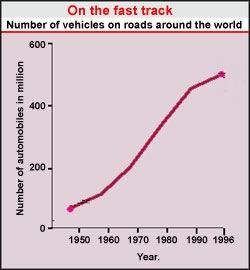A clean drive
 As the number of vehicles produced around the world increase every year, so does the pollution from these vehicles. The number of automobiles on the roads around the world have increased around ten-fold in the past 50 years. Analysts predict that the number will double in the next 25 years. Now, many countries are experimenting with alternatives to gasoline and diesel fuel in an attempt to reduce harmful emissions. These alternatives are liquefied petroleum gas extracted from natural gas; compressed natural gas derived from gas wells or in conjunction with crude oil production; Ethanol, derived from biomass and Methanol which is derived from natural gas, biomass or coal.
As the number of vehicles produced around the world increase every year, so does the pollution from these vehicles. The number of automobiles on the roads around the world have increased around ten-fold in the past 50 years. Analysts predict that the number will double in the next 25 years. Now, many countries are experimenting with alternatives to gasoline and diesel fuel in an attempt to reduce harmful emissions. These alternatives are liquefied petroleum gas extracted from natural gas; compressed natural gas derived from gas wells or in conjunction with crude oil production; Ethanol, derived from biomass and Methanol which is derived from natural gas, biomass or coal.
| Eco-friendly fuels Number of vehicles using various types of fuels | |||||
| Country | Fuel type | ||||
| CNG* | LPG* | Ethanol | Methanol | Electric | |
| Brazil | 4,000,000 | ||||
| Japan | 200,000 | 1,500,000 | 1,300 | ||
| The Netherlands | 500 | 560,000 | 300 | ||
| USA | 82,700 | 273,000 | 6,200 | 20,000 | 4,000 |
| Italy | 300,000 | 300 | |||
| Canada | 36,000 | 160,000 | 3,000 | 100 | |
| New Zealand | 100,000 | ||||
| Russia | 75,000 | ||||
| Britain | 400 | 25,000 | |||
| China | 10,000 | 1,000 | |||
| *CNG: compressed natural gas; LPG: liquefied petroleum gas | |||||
Related Content
- Order of the National Green Tribunal regarding open defecation during Maha Kumbh in Prayagraj, Uttar Pradesh, 24/02/2025
- Unleashing the full potential of industrial clusters: Infrastructure solutions for clean energies
- Affidavit by the District Magistrate, Kanpur Dehat, Uttar Pradesh regarding the encroachment and disappearance of the ponds, 15/01/2025
- Order of the National Green Tribunal regarding dumping of garbage in the entire town of Silchar, Assam, 18/04/2024
- CO2 emissions in 2023
- Report by the Commission for Air Quality Management in the National Capital Region and adjoining areas, 20/02/2024
